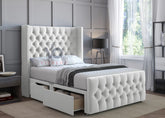The Connection Between Mattresses and Back Pain Explained
Have you ever woken up feeling like you've gone ten rounds with a heavyweight boxer? That nagging back pain that greets you each morning might not just be age or yesterday's yard work - your mattress could be the sneaky culprit behind your discomfort.
For something we spend roughly a third of our lives on, mattresses don't always get the attention they deserve. Yet that seemingly innocent sleep surface can make the difference between starting your day with a spring in your step or a creak in your back.
Let's dive into the real connection between mattresses and back pain, and discover how the right sleep surface might finally give your achy back the relief it's been begging for.
Why Your Mattress Matters More Than You Think
Your back doesn't clock out when you do. While you're dreaming about tropical vacations or winning the lottery, your spine is hard at work recovering from the day's stresses. But it can only do this vital maintenance work properly when it's well-supported.
Think about it - your spine has a natural curve. When you sleep on a mattress that doesn't accommodate this curve, your body spends hours fighting against an unnatural position. That's eight hours of nightly stress that your back simply doesn't need.
The wrong mattress forces your muscles to work overtime when they should be relaxing, creates pressure points where there shouldn't be any, and prevents your spine from properly aligning. No wonder you wake up feeling worse than when you went to bed!
Signs Your Mattress Is Causing Your Back Pain
Not sure if your bed is the villain in your back pain story? Here are some visible signs that your mattress might be working against you:
-
You wake up with pain that wasn't there when you went to bed
-
Your back pain improves as the day goes on (rather than getting worse with activity)
-
You find yourself tossing and turning, unable to get comfortable
-
You sleep better in other beds (like hotel beds or at a friend's house)
-
Your mattress shows visible signs of wear like sagging or indentations
-
Your mattress is over 7-10 years old
-
You find yourself rolling toward the center of the bed involuntarily
If you're nodding along to several of these points, it might be time to consider that your trusty mattress has become your back's worst enemy.
How Different Mattress Types Affect Your Back
Not all mattresses are created equal, especially when it comes to back support. Let's break down how different types can help or hurt your spinal health:
Memory Foam Mattresses
Memory foam has become incredibly popular, and for good reason. These mattresses contour to your body's unique shape, providing customized support where you need it most. For back pain sufferers, memory foam can be a blessing because it:
-
Distributes body weight evenly, reducing pressure points
-
Adapts to your body's contours, supporting the natural curve of your spine
-
Limits motion transfer, so you're less likely to be disturbed by a restless partner
However, some people find that softer memory foam mattresses allow them to sink too deeply, which can throw the spine out of alignment. The key is finding the right firmness level for your body type and sleeping position.
Innerspring Mattresses
The traditional innerspring mattress uses a network of metal coils for support, topped with various comfort layers. Modern versions often come with pocketed coils that move independently, providing better contouring than older models. Innerspring mattresses can be good for back pain because they:
-
Offer firm support that prevents excessive sinking
-
Provide good airflow, keeping you cooler during sleep
-
Often have reinforced edges, making it easier to get in and out of bed
The downside? They might create pressure points for some sleepers, especially those with joint pain or those who sleep on their sides.
Hybrid Mattresses
Can't decide between memory foam and innerspring? Hybrid mattresses offer the best of both worlds, with a coil support system and substantial foam comfort layers. Many divan beds with mattress options now feature hybrid designs that can:
-
Provide the support of springs with the pressure relief of foam
-
Offer a balance of bounce and contouring
-
Keep sleepers cooler than all-foam options
Hybrids tend to be a good middle ground for couples with different preferences or individuals who want both support and cushioning.
Latex Mattresses
Natural latex mattresses have gained popularity among eco-conscious consumers and back pain sufferers alike. These mattresses offer a unique feel that's both supportive and responsive. Latex can be excellent for back pain because it:
-
Provides consistent support throughout the entire sleep surface
-
Offers a natural bounce that makes changing positions easier
-
Typically lasts longer than other mattress materials
The responsive nature of latex prevents the "sinking in" feeling that some people dislike about memory foam, while still contouring enough to relieve pressure points.
Finding Your Perfect Firmness Level
One of the most common questions about mattresses and back pain is: "Should I choose a firm or soft mattress for back pain?"
The answer isn't as straightforward as mattress companies might have you believe. The ideal firmness depends on your:
Body Weight
-
Lighter individuals (under 130 pounds) often need softer mattresses to allow enough sinking for proper contouring
-
Average weight sleepers (130-230 pounds) typically do well with medium to medium-firm mattresses
-
Heavier individuals (over 230 pounds) usually need firmer mattresses to prevent excessive sinking
Sleeping Position
-
Side sleepers need some softness to accommodate their shoulders and hips
-
Back sleepers generally benefit from medium-firm support
-
Stomach sleepers (though this position isn't recommended for back pain) need firmer support to keep the hips from sinking
Personal Comfort Preferences
Sometimes the "technically correct" mattress just doesn't feel right to you. Your comfort matters - if you can't relax on your mattress, you won't sleep well, regardless of its orthopedic benefits.
The "one-size-fits-all" approach doesn't work when it comes to mattresses. What works for your neighbor might be completely wrong for you. That's why many quality mattress retailers, including those selling divan beds with mattress sets, offer comfort trials that let you test the mattress in your own home.
The Complete Sleep System
While we're focusing on mattresses, it's important to recognize that your entire sleep system matters when it comes to back pain.
The Importance of a Good Foundation
Even the best mattress can't perform properly without the right foundation. This is where divan beds come into the picture. A quality divan bed provides:
-
Balanced and consistent support for your mattress
-
No gaps or slats that might allow uneven sinking
-
Stability that prevents unwanted movement during sleep
Unlike traditional bed frames with widely spaced slats, divan beds with mattress options offer a solid base that helps your mattress provide the support your back needs. Whether you choose a single divan bed with a mattress or a king-size divan bed with mattress, that solid foundation makes a difference.
Some options even combine storage solutions with proper support, like a single divan bed with storage and a mattress, giving you the best of both worlds.
Pillows Matter Too
Your pillow plays a crucial role in spinal alignment, working together with your mattress to keep your head, neck, and spine properly positioned. The right pillow should:
-
Keep your head aligned with your spine (not pushed forward or allowed to fall backward)
-
Be the right height for your shoulder width and sleeping position
-
Support the natural curve of your neck
A good mattress paired with the wrong pillow is like wearing running shoes with a business suit - things just don't work right together.
When to Replace Your Mattress
Even the best divan bed with mattress and headboard combination won't last forever. Mattresses wear out gradually, often so slowly that we don't notice the declining support until our backs start complaining.
Industry experts generally recommend replacing your mattress every 7-10 years, but this can vary based on:
-
The quality and type of mattress
-
Your body weight
-
How the mattress has been used and maintained
-
Whether the mattress has been properly supported
Signs that it's time for a replacement include:
-
Visible sagging or indentations
-
Feeling the springs through the mattress surface
-
Waking with increased pain or stiffness
-
Sleeping better on other mattresses
-
Increased allergies or asthma symptoms (due to dust mite accumulation)
Don't wait until your mattress is visibly worn out - by then, it's likely been compromising your back health for months or even years.
Budget-Friendly Options That Don't Sacrifice Support
Quality sleep shouldn't be a luxury only available to those with deep pockets. There are plenty of budget-friendly options that still provide the support your back needs.
Value Divan Packages
Look for cheap divan beds with mattress options that don't compromise on essential features. Many retailers like Vizbeds UK offer divan beds and mattress set combinations at competitive prices, especially during sales periods.
A cheap divan bed with mattress and headboard doesn't necessarily mean poor quality - it might simply be:
-
Last season's design
-
A discontinued model
-
Part of a promotional bundle
-
From a brand that focuses on value rather than luxury features
Focus on the core support features rather than fancy add-ons like cooling gel or organic cotton covers if your budget is tight.
Smart Shopping Strategies
To get the most back-supporting product according to your budget:
-
Shop during major sales (holiday weekends, end of season)
-
Look for floor models or returned items with full warranties
-
Consider direct-to-consumer brands that cut out the middleman
-
Check for bundle deals that include foundations like a double divan bed with mattress and headboard options
Remember that a quality mattress is an investment in your health - skimping too much might cost you more in the long run through medical bills and lost productivity.
Adjusting to Your New Mattress
When you finally take the plunge and get that new divan bed with mattress you've been eyeing, don't expect instant pain relief. Your body needs time to adjust to the new support system.
Most manufacturers recommend giving yourself 30-60 days to adapt to a new mattress, especially if you're switching types (like going from innerspring to memory foam). During this adjustment period:
-
Your muscles need to relax into new patterns
-
Your body needs to get used to different pressure point relief
-
Your sleep habits may need to adjust to the new feel
Think of it like breaking in a new pair of supportive shoes - there might be a brief uncomfortable period before you experience the benefits.
Simple Ways to Reduce Back Pain Beyond Your Mattress
While the right mattress is crucial for back health, it's not the only factor. Here are some complementary strategies to reduce back pain:
Sleep Position Adjustments
-
Back sleepers: Try placing a small pillow under your knees to maintain the natural curve of your spine
-
Side sleepers: Put a pillow between your knees to keep your hips aligned
-
Stomach sleepers: Consider training yourself to sleep in another position, as stomach sleeping is hardest on your back
Bedtime Routines
-
Gentle stretching before bed can release tension
-
A warm shower or heating pad can relax tight muscles
-
Avoiding screen time before bed can improve sleep quality and reduce pain sensitivity
Daily Habits
-
Regular exercise strengthens back-supporting muscles
-
Proper lifting techniques prevent new injuries
-
Good posture during the day complements good posture during sleep
Remember that even the best king-size divan bed with mattress and headboard can't compensate for poor daytime habits that strain your back.
When to See a Doctor
While mattress-related back pain typically improves with the right sleep surface, some back pain requires medical attention. See a doctor if:
-
Pain is severe or getting progressively worse
-
Pain radiates down one or both legs
-
You experience numbness, tingling, or weakness
-
Pain is accompanied by unexplained weight loss or fever
-
Pain persists despite trying a new mattress and other interventions
Don't assume all back pain is mattress-related - sometimes it's a symptom of something more serious that needs proper medical attention.
Finding Your Perfect Mattress Match
Ready to say goodbye to morning back pain? Here's a simple process to find your ideal mattress:
-
Determine your primary sleeping position
-
Consider your body weight and personal comfort preferences
-
Decide on a mattress type that addresses your specific needs
-
Choose a quality foundation like a divan bed to properly support your mattress
-
Look for options with sleep trials and good warranties
-
Set a realistic budget that values your long-term health
-
Test mattresses in person when possible, lying in your typical sleep position for at least 10-15 minutes
Whether you end up with a single divan bed with mattress for a child's room or a luxury king-size divan bed with mattress and headboard for your master bedroom, taking the time to find the right match for your specific needs will pay dividends in better sleep and less pain.
Conclusion
The connection between mattresses and back pain is real and significant. While no mattress can cure underlying medical conditions, the right sleep surface can dramatically reduce pain and prevent new problems from developing.
Think of your mattress as a silent healthcare provider - one that works nightly to help your body recover and prepare for the day ahead. By investing in a quality mattress on a supportive foundation like a divan bed, you're not just buying a piece of furniture; you're investing in your overall well-being.
Whether you choose a single divan bed with mattress and storage for a compact space or a spacious king size divan bed with mattress for luxurious comfort, the right choice can be the difference between waking up ready to seize the day and waking up wishing you could stay in bed (despite how uncomfortable it is).
Your back carries you through life every day. Isn't it time you gave it the nighttime support it deserves? Check out our collection of mattresses to choose the right one for your needs.





